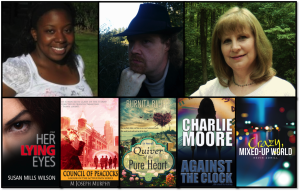This product will haunt your lips forever. As seen in an advertisement for lip butter:
![]()
“Supernatural” is a word, which is why software probably didn’t pick it up. Be careful with your spelling!
This product will haunt your lips forever. As seen in an advertisement for lip butter:
![]()
“Supernatural” is a word, which is why software probably didn’t pick it up. Be careful with your spelling!
by Anita Stratos, Proof Positive editor
Picture this: you’re craving apple pie – one of those “just gotta have it” days – so you go to your favorite café and order up a slice.
Your mouth waters when the server puts your pie in front of you, but when you look closer, you see cranberries, blueberries and pecans mixed with a few apples inside a coconut crust.
“What’s this?” you ask your server with disappointment. “I just wanted a simple apple  pie.”
pie.”
“That’s our pastry chef’s version of apple pie,” she answers. “He likes to stretch his creative culinary muscle.”
Do you think you got what you ordered? Or did you get a more complex dessert, a berry-apple-nut pie with a unique crust? The chef promised apple pie on the menu, but he loaded it up with lots of other things and topped it off in a nontraditional way.
While that gourmet pie might be delicious and welcome on any other night, this time you wanted apple pie and trusted what was written on the menu. So even though the recipe might win a James Beard award, it’s most unwelcome and unappreciated by you at this moment.
Two things went wrong here, and the same things can go wrong with your writing, too.
First, don’t promise something in your title, cover image, or book blurb that you don’t deliver in your story. A book blurb that describes a fantasy novel but delivers a romance is bound to get bad reviews. Your writing may be superb, but you attracted the wrong audience.
The first takeaway: Don’t write “apple pie” on the menu when you’re crafting a multi-berry-apple-nut coconut-crusted pie.
Second, write your prose in a way that best serves your story, not in a complex way that doesn’t match the story or reflect something within the book or character(s). Unnecessarily complex writing gets very tiresome very quickly, slows readers down, and could sound pretentious.
The second takeaway: Serve apple pie to people who love apple pie, and save the gourmet blends for a different audience.
Get Down With The Awethors co-creator D.M. Cain graciously suggested that I should do an interview too. As I haven’t published a full book yet, I thought I’d take her up on it in a different way: by telling you why I love all of you.
Indie authors have something really special about them: a sense of community. Why is this so special? Because even though we’re all technically competing with each other, we put that behind us as something that doesn’t need to be acknowledged, as something that is really not the point, and instead we focus on supporting each other. Where else can you find a sense of community that strong?
We exchange books, we give honest reviews, we spread the word on social media for each other, we comment on each other’s work before it’s published. There’s no end to indie authors’ generosity, and it always makes my day to see indie authors working together. Events like the Awethors Facebook event help us not only connect with readers but network with each other. And those relationships last forever.

Just a few of the amazing authors Proof Positive has interviewed and some of the books we’ve worked on!
One of the reasons I started my editing business is to help indie authors succeed, not only through editing but through exposure. I have read some of the most incredible books by indie authors, and I’ve found that I end up reading bestselling traditionally published books mostly to keep up with publishing trends – not because they’re better. This was a big eye opener for me when I first discovered it, and I hope to help open other readers’ eyes to the fantastic talent right in front of them.
Congratulations to all of you who have had the ambition and courage to publish your own books or even get your start by publishing your own books. I hope to join the ranks of such an awesome group soon.
~~~
 Christie Stratos is an editor and award-winning writer who holds a degree in English Literature. An avid reader of all genres and world literature, Christie reads everything from bestsellers to classics to indies, and is an audiobook reviewer at AudioBookReviewer.com. She is also a writer of short stories, poetry – some of which have already been published – and upcoming novels. She dabbles in all genres.
Christie Stratos is an editor and award-winning writer who holds a degree in English Literature. An avid reader of all genres and world literature, Christie reads everything from bestsellers to classics to indies, and is an audiobook reviewer at AudioBookReviewer.com. She is also a writer of short stories, poetry – some of which have already been published – and upcoming novels. She dabbles in all genres.
Connect with Christie
Author website and blog
Twitter
Google+
Pinterest
Goodreads
YouTube
LinkedIn
AudioBookReviewer profile (scroll down!)
Connect with Proof Positive
Facebook
Twitter (same as my personal one!)
Google+
LinkedIn
AUTHORSdb
by Anita Stratos, Proof Positive Editor
In psychology, when a person withholds affection from their partner, it’s considered a form of emotional abuse. In writing, withholding important information from the reader could almost be classified as story suicide.
I’m not talking about flashbacks here, I’m talking about important elements that should be part of readers’ information base.
Springing certain surprises on readers can be a great tool and can generate that sought-after “I never saw it coming” response from readers that’s both exciting and exhilarating.
But if you hold that coveted hole card too long or if the information you’re withholding shouldn’t be a secret at all, it can have the opposite effect and make readers angry or confused.
That’s because certain pieces of information can change readers’ perspectives on the character or situation, change their expectations of the character’s behavior in a way that the new information makes everything seem suddenly out of character, or makes them rethink the character they thought they knew.
None of these distractions are good.
Let’s take a peek into a couple of small, overly condensed scenes about Sonya’s job relocation and how it put a devastating strain on her family.
Page 56:
The move couldn’t have come at a worse time – it was February.
“But Mom,” Ellen complained, “first you make us lose all our friends and move to a new state for your job, and now you’re sticking me in a new school after everyone’s already got their friends. They’ll treat me like a freak! I’ll never make new friends!”
Sonya’s husband chimed in with complaints of his own. “And I was just about to get reassigned to the most lucrative region in the state. I put ten years of hell into that company just waiting for a shot at this assignment!”
With her father’s apparent support, Ellen went for the jugular. “Whatever happened to your old guilt line, ‘family comes first’? How come your job comes before your family when it suits you?”
Fast forward to page 89:
It wasn’t bad enough that their luggage had been lost by the airline, but the moving truck had suddenly disappeared with all of their household belongings as well. Sonya was beginning to think that the “universe” was sending her a very disapproving message about forcing her family to uproot themselves and their lives for her own personal gain.
And now Ellen’s mystery symptoms were showing up worse than ever, probably from the stress of the move. Her body was covered in rashes, she was constantly fatigued, and see seemed to be allergic to everything. This had happened on and off throughout her twelve years of life, and she had used this as part of her argument to not to move. “What if my problems get worse? How can I meet new kids looking like a blotchy mess? I don’t even have a doctor out there,” she’d said. Her current doctor had also suggested that Sonya factor Ellen’s undiagnosed ailment into her decision, since he had recently started a series of tests in an effort to figure out what was happening. Since birth, Ellen had been plagued by mystery symptoms, and Dr. Ellingworth was the first one who had ever tried to figure out the cause rather than just treating the symptoms with prescription creams and pills.
Wow, that’s a lot of backtracking. The writer not only went back in time to add more to Ellen’s original argument on page 59, but s/he went even further back in Ellen’s life to a time before the story started, which should have been covered early on.
Backward writing like this not only removes readers from the current situation in the story, it also changes their image of Ellen, her day-to-day struggles, and adds another level to Sonya’s selfishness. It’s like plunging readers into ice water from the comfortable warmth of a flowing storyline, then expecting them to jump back into the pool without so much as a transitional shower.
So when you’re editing your first draft, be mindful of the order in which you tell your story, know the difference between well-placed, well-orchestrated flashbacks and backward writing, and use surprises wisely. Your novel – and your readers – will thank you.
by Anita Stratos, Proof Positive Editor
I have a confession to make. I’m a binge word writer. I tend to binge on certain words or phrases when writing a first draft like they were my favorite flavor of ice cream. In fact, if the first draft of my writing was ice cream, I’d weigh 500 pounds by now.
That’s because I tend to use a particular word or phrase (or both) repeatedly, as if it’s the only way to describe a certain attitude, action, feeling, whatever. In one first draft, “raised eyebrows” were flying all over the fictitious town; in another, “sideways glances” stole the scenes. Yikes.
The binge words that attach themselves to my brain are different with every manuscript I write. For some reason, different stories bring out different binges. So it’s not like I can just watch out for a particular word or phrase with each manuscript. It’s always a surprise binge – the ice cream attacks me rather than me attacking it.
Train-of-thought writing is like that for me. And while anything goes in a first draft, those repetitions have to be replaced by more creative terms during the revision process.
Repetitions aren’t always obvious during the writing process because I’m so focused on the overall work or so engrossed in writing a scene. And that’s what’s most important with a first draft – getting those thoughts on paper without stopping to edit (something particularly difficult for me; the editor in me always tries to strong-arm the writer in me). But when rereading during that first revision, those binges pop off the page like hot pink Mexican jumping beans.
And that’s when the real work begins. Because sometimes a binge word just seems so perfectly suited in each and every place it appears that it’s hard to imagine any other word doing as good of a job.
At that point I have to step back from the writing and sometimes even act the dialogue or situation out, which can really help open the door for a better descriptive. In fact, sometimes the entire scene can benefit from my little impromptu plays because another dimension to the story or scene may reveal itself, or a character may surprise me with a new attitude or perspective.
You’re probably thinking, “Why doesn’t she just use a thesaurus?” Well, I do use an expanded thesaurus, but it still doesn’t always give me what I need, especially when it comes to phrases. But as a last resort, I’ll check the words it offers just in case it jumpstarts my brain.
And if that doesn’t work, I send my revised, best-as-I-can-get-it draft complete with binge words to my editor and let her work it out. 😉 (Thanks, Christie!)
by Anita Stratos, Proof Positive Editor
So you’ve given your new book as much social media play as you possibly can. Your efforts have resulted in a nice, steady uptick in visitors to your author website, which is just what you wanted.
Your blog talks about things like your writing process, inspirations for your book, your characters, your favorite writing spots, real world issues related to your book – whatever you feel is relevant and interesting.
Could any of this actually be working against the sale of your book?
If your website or blog posts contain misspellings, grammatical errors, poor phrasing – all those things you’ve hopefully had edited out of your book – then your credibility will take a hit.
Your website and blog posts may very well be the first impression many potential readers  get of you and your writing, and as the old saying goes, you never get a second chance to make a first impression.
get of you and your writing, and as the old saying goes, you never get a second chance to make a first impression.
Readers view your website and blog posts as a reflection of you and your work. If your blog posts don’t show that you care enough to double and triple check for errors or write in a meaningful way, readers will understandably assume your book will be the same.
If you can’t step back from your writing far enough to see what needs fixing, ask a friend or fellow writer you trust to help, or see if your editor is willing to do it for a small fee.
One last note: choose your font carefully. This isn’t just a lot of type hype – fonts speak to readers. There are entire studies on the psychology of typography and the messages different fonts convey. Just like choosing the right name for your characters depending on their personalities (you wouldn’t name a tough, bar brawling assassin Harvey Milktoast), you also wouldn’t use a futuristic-looking font to describe a cozy, laid-back country romance story or Comic Sans font for a thriller.
With a shiny clean website, you’ll give your book a much better chance.
by Anita Stratos, Proof Positive Editor
Did you trip over the title of this post? Did you have to read it twice? If so, that’s because both phrases, “superfluous verbiage” and “unnecessary words”, mean the same thing, but your mind was trying to discern a difference.
When you use extra words or duplicate a meaning in your writing, it can do a couple of different things: it can slow the action or forward movement of the story, and/or it can stop readers in their tracks while their minds backtrack over the repetition, searching for a missed meaning or misinterpretation. Neither is good.
Repetitions and extra verbiage slow stories down and can put the brakes on action scenes.
A few smaller examples we see frequently are:
“She took out her cell phone and dialed his number, then immediately hung up the phone.” The words “the phone” are superfluous because it’s already clear that the person was using a phone. Something like this may seem insignificant, but eliminating even the smallest unnecessary words tightens your writing and moves the story along faster. And in a story where there’s one superfluous phrase, chances are there are many more – add them up and you’ve got a lot of drag.
“His train was arriving at five o’clock p.m. in the evening.” When referring to a time after noon, “p.m.” is used, just like “a.m.” is used for morning. Therefore, using “in the evening” after “p.m.” is repetitious and can actually be annoying to some readers.
noon, “p.m.” is used, just like “a.m.” is used for morning. Therefore, using “in the evening” after “p.m.” is repetitious and can actually be annoying to some readers.
“He put his hat on his head as he walked out of her life forever.” “On his head” is extra verbiage because it’s assumed that’s where he’d put his hat – where else would it go? “He put on his hat as he walked out of her life forever” is smoother and has more impact without the unnecessary words.
Even more problematic, though, are entire phrases that essentially repeat what was just said without adding any new information.
“She tucked the letter into her pocket, secreting it away from prying eyes. It would be safe in her pocket where no one would see it.” If you see this type of repetition in your writing, choose whichever phrasing best fits the scene and keeps the action or tension going. Sometimes you may end up using the best of both worlds – a combination of the two: “She secreted the letter away in her pocket, where it would be safe from prying eyes.” No repetition, but plenty of information in a condensed and to-the-point way.
Tight writing moves faster and makes your points clearer, which readers always appreciate.
“But Your Honor, I intended to help that little old lady across the street. Her purse handle just happened to loop over my arm, and I didn’t realize it was there until I was several blocks away and that cop tackled me!”
Do you think any judge in the world would believe that statement? More importantly, do you think he even cares about the thought process or supposed intention the defendant had? No? Well, the same thing goes for writing – readers are your judges, and they don’t know or care about your intentions, they only know and care about what’s actually written on the page.
And since the only reality your readers know is what they read, you have to make your intentions perfectly clear in the written word. Readers can’t stop to think about what you  may have intended when a scene or sentence doesn’t quite make sense or fit with a character’s personality or situation. Nor should they have to. And they’re not mind readers either.
may have intended when a scene or sentence doesn’t quite make sense or fit with a character’s personality or situation. Nor should they have to. And they’re not mind readers either.
Sometimes when we’re writing, we’re so in touch with our characters and their situations that we don’t clarify our intentions in a scene well enough.
Have you ever had a teacher whose lectures could only be understood by someone already knowledgeable in the field, while those of us on the “outside” couldn’t grasp their meaning? Or read instructions that skipped over the details and assumed the user would just “get it”? I think we’ve all experienced at least one of these things; personally, I’ve been on the receiving end of both. And it’s very frustrating.
Writers hire editors to take an objective look at their work before it’s published – at that point, the editor is one of your first readers, so if something is unclear or confusing to her/him, it will most likely be unclear to your future readers as well.
An editor’s job is to point out these problems within a story and suggest a better way.
A writer’s job is to take that point constructively and seriously consider the possibility that it needs modification in order to be easily understood or fit with the rest of the story.
But sometimes a writer is so married to their work that they become defensive about every line, even saying that they think readers will understand their intentions that aren’t written or just allow for incongruous scenes. If you, as a writer, hear yourself saying that, STOP. While the final decision always belongs to the writer as to how the book is written, it serves your book – and your readers – best if you consider the possibility that your intentions are not coming across in your writing.
The upshot: unless you’re writing experimental literature in which readers expect and want to spend time figuring things out, your words need to clearly convey your intentions, not suggest or skirt them.